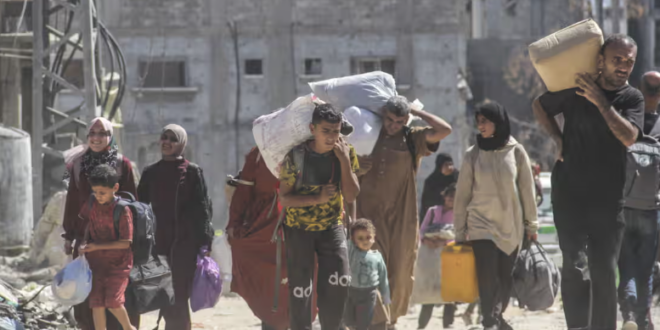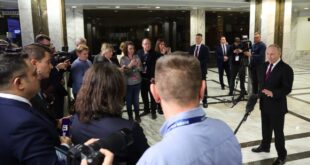Muhamad Yehia
WHO to evacuate 1,000 Palestinian women and children for urgent medical care
Up to 1,000 women and children needing medical care will shortly be evacuated from Gaza to Europe, the head of the World Health Organization’s Europe branch said in comments published on Monday.
Israel, which is besieging the war-devastated Palestinian territory, “is committed to 1,000 more medical evacuations within the next months to the European Union,” Hans Kluge said in an interview with AFP.
He said the evacuations would be facilitated by the WHO – the United Nations health agency – and the European countries involved.
On Thursday, UN investigators said Israel was deliberately targeting health facilities in Gaza, and killing and torturing medical personnel there, accusing the country of “crimes against humanity”.
Rik Peeperkorn, WHO representative in the occupied Palestinian territories, said in May that about 10,000 people needed evacuating from Gaza for urgent medical care.
The WHO Europe has already facilitated 600 medical evacuations from Gaza to seven European countries since the latest war began there in October 2023.
“This would never have happened if we did not keep the dialogue,” Kluge said.
“The same [is true] for Ukraine,” he added. “I keep the dialogue with all partners
Iran says it has warned UN nuclear watchdog about Israeli threats against its nuclear sites
Iran has warned the UN nuclear watchdog about Israel’s threats against its nuclear sites, foreign ministry, spokesperson Esmaeil Baghaei said on Monday at a weekly news conference.
Israel has vowed to attack Iran in retaliation for a volley of Iranian missiles launched on 1 October, leading to widespread speculation that Iran’s nuclear sites could be among Israel’s targets.
“Threats to attack nuclear sites are against UN resolutions …. And are condemned … we have sent a letter about it to … the UN u
Ali Daher first heard the explosion and then he felt the pain. An Israeli aircraft loitering high above had shot two rockets at the building next door, collapsing the top two floors and showering him and his two sons with a deadly spray of concrete and jagged metal.
The target of the strike was the Dar al-Salaam hotel – Arabic for “house of peace” – in the southern Lebanese town of Wardaniyah, converted in the last weeks into a government displacement centre for 24 families forced to flee their homes under Israeli bombing. Originally a German-Lebanese centre set up to promote cultural understanding, bronze statuettes and pieces of Lebanese antiquities had been pushed to the side to make room for mattresses and boxes of aid.
The strike on 9 October killed five people and injured 12. It was the first time that Wardaniyah had been targeted by Israel, but was the latest in a series of Israeli strikes on buildings hosting displaced people in parts of Lebanon thought to be safe and that have otherwise not seen any fighting.
“We wanted to go somewhere safe, where there is no bombing, war or [militias], so we came here. Why did they strike here? We don’t know,” said Ali Daher, a 36-year-old mine clearance operator who was displaced from Tyre, south Lebanon, on 30 September. He held out his fractured wrist and pointed to his one-year-old son Kareem’s arm, which had been bandaged after a piece of debris tore it open.
The effects are also being felt in Lebanese society, where local officials have said the fear of strikes have inflamed tensions between members of the country’s many sects and the largely Shia Muslim displaced, who they are afraid to welcome. Unconfirmed rumours of Hezbollah fighters hiding among the displaced have proliferated, despite the vast majority of displaced them being civilians.
More than 1.2 million people have been displaced in Lebanon over the last year, most of them since 23 September, when Israel escalated its aerial campaign over wide swathes of the country. Many have sought shelter in Christian and Druze-majority areas that had previously been spared Israeli bombing.
US envoy Amos Hochstein will be in Beirut on
Monday for talks with Lebanese officials on conditions for a ceasefire between Israel and Lebanese armed group Hezbollah, two sources in Lebanon told Reuters, as Israel expanded its air campaign on the group’s assets overnight.
Israeli strikes late on Sunday hit several branches of a financial institution linked to Hezbollah in Beirut, Lebanon’s south and the Bekaa valley, but no casualties were immediately reported.
Israel has reportedly given the United States a document with its conditions for a diplomatic solution to end the war in Lebanon, Axios reported on Sunday, citing two US officials and two Israeli officials.
Israel has demanded its IDF forces be allowed to engage in “active enforcement” to make sure Hezbollah doesn’t rearm and rebuild its military infrastructure close to the border, Axios reported, citing an Israeli official.
Israel also demanded its air force have freedom of operation in Lebanese airspace, the report added.
A US official told Axios it was highly unlikely that Lebanon and the international community would agree to Israel’s conditions.
 موقع وجه أفريقيا موقع وجه أفريقيا هو موقع مهتم بمتابعة التطورات في القارة الأفريقية
موقع وجه أفريقيا موقع وجه أفريقيا هو موقع مهتم بمتابعة التطورات في القارة الأفريقية



